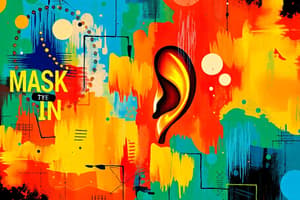Podcast
Questions and Answers
What percentage of adults over 50 years old is affected by sudden sensory hearing loss?
What percentage of adults over 50 years old is affected by sudden sensory hearing loss?
- 25% (correct)
- 75%
- 10%
- 50%
Which of the following is NOT a potential cause of sudden sensory hearing loss?
Which of the following is NOT a potential cause of sudden sensory hearing loss?
- Temporal bone fracture
- Bacterial infection
- Cochlear implant failure (correct)
- Aminoglycoside toxicity
Which of the following theoretical pathways is NOT associated with idiopathic sudden sensory hearing loss?
Which of the following theoretical pathways is NOT associated with idiopathic sudden sensory hearing loss?
- Immune-mediated inner ear disease
- Labyrinthine viral infection
- Auditory nerve compression (correct)
- Labyrinthine vascular compromise
What should be the initial step in the work-up for sudden hearing loss?
What should be the initial step in the work-up for sudden hearing loss?
Which age group has the highest occurrence of sudden sensory hearing loss?
Which age group has the highest occurrence of sudden sensory hearing loss?
Which condition is associated with labyrinthine vascular compromise?
Which condition is associated with labyrinthine vascular compromise?
What type of trauma can potentially lead to sudden sensory hearing loss?
What type of trauma can potentially lead to sudden sensory hearing loss?
What is the most prevalent sensory deficit found in older adults?
What is the most prevalent sensory deficit found in older adults?
What is the immediate goal when assessing sudden hearing loss?
What is the immediate goal when assessing sudden hearing loss?
What factor can improve the prognosis for recovery from hearing loss?
What factor can improve the prognosis for recovery from hearing loss?
What type of hearing loss does the Rinne test help to specifically identify?
What type of hearing loss does the Rinne test help to specifically identify?
In a Weber test, with unilateral conductive loss, where does the sound lateralize?
In a Weber test, with unilateral conductive loss, where does the sound lateralize?
What is a common reversible cause of sensorineural hearing loss?
What is a common reversible cause of sensorineural hearing loss?
What does a normal Rinne test indicate regarding air conduction (AC) and bone conduction (BC)?
What does a normal Rinne test indicate regarding air conduction (AC) and bone conduction (BC)?
What should be carefully examined during the physical exam for hearing loss?
What should be carefully examined during the physical exam for hearing loss?
Which of the following statements about tuning fork tests is true?
Which of the following statements about tuning fork tests is true?
What defines sudden hearing loss?
What defines sudden hearing loss?
Which of the following is a type of sensorineural hearing loss?
Which of the following is a type of sensorineural hearing loss?
What is the primary treatment for sensorineural hearing loss?
What is the primary treatment for sensorineural hearing loss?
What type of hearing loss occurs due to issues in the outer and middle ear?
What type of hearing loss occurs due to issues in the outer and middle ear?
Which of the following is NOT included in the classification of sudden hearing loss?
Which of the following is NOT included in the classification of sudden hearing loss?
What can cause conductive hearing loss?
What can cause conductive hearing loss?
Which of the following is a common factor associated with hearing loss?
Which of the following is a common factor associated with hearing loss?
What does the organ of Corti relate to in terms of hearing loss?
What does the organ of Corti relate to in terms of hearing loss?
What condition is NOT listed as a differential diagnosis for sudden hearing loss?
What condition is NOT listed as a differential diagnosis for sudden hearing loss?
Which treatment is used to improve blood supply to the cochlea in cases of sudden hearing loss?
Which treatment is used to improve blood supply to the cochlea in cases of sudden hearing loss?
What is presumed to be the mechanism of action for corticosteroids in treating sudden hearing loss?
What is presumed to be the mechanism of action for corticosteroids in treating sudden hearing loss?
How does hearing loss impact the elderly population according to the content?
How does hearing loss impact the elderly population according to the content?
What is the relationship between hearing loss and dementia in older adults?
What is the relationship between hearing loss and dementia in older adults?
Which treatment option is mentioned as having limited use in treating hearing loss?
Which treatment option is mentioned as having limited use in treating hearing loss?
What potential consequence of hearing loss can affect the quality of life in older adults?
What potential consequence of hearing loss can affect the quality of life in older adults?
What is one of the anti-inflammatory agents primarily used to treat sudden hearing loss?
What is one of the anti-inflammatory agents primarily used to treat sudden hearing loss?
Flashcards are hidden until you start studying
Study Notes
Hearing Loss
- Hearing loss is the decreased ability or complete inability to hear.
- Hearing loss may involve the external, middle, or inner ear and can be unilateral or bilateral.
- Definitions of sudden hearing loss are based on severity, time course, audiometric criteria, and frequency spectrum of the loss.
Sensorineural Hearing Loss
- Sensorineural hearing loss involves a lesion in the organ of Corti or the central pathways, including the eighth nerve and auditory cortex.
- Examples of causes include presbycusis, noise-induced hearing loss, and ototoxic drug-related hearing loss.
- Sensorineural hearing loss is typically irreversible, and amplification is often required.
Conductive Hearing Loss
- Conductive hearing loss involves a lesion in the outer or middle ear, up to the level of the oval window.
- Examples of causes include structural abnormalities, cerumen impaction, perforation of the tympanic membrane, middle ear fluid, damage to the ossicles from trauma or infection, middle ear tumors, trauma, and temporal bone fractures.
Occurrence of hearing loss
- Hearing loss occurs in about 25% of adults over 50 years old and over 80% of those over 80 years old.
- It is the most common sensory deficit in older adults and increases with age.
Pathophysiology of sudden hearing loss
- Theories for the pathophysiology of idiopathic sudden sensory hearing loss include labyrinthine viral infection, labyrinthine vascular compromise, intracochlear membrane ruptures, and immune-mediated inner ear disease.
Causes of Hearing Loss
- Infections: Bacterial or viral
- Inflammation: Sarcoidosis, Wegener granulomatosis, Cogan syndrome
- Vascular: Hypercoagulable states (including Waldenstrom macroglobulinemia), emboli (including post CABG surgery), and post-radiation therapy
- Tumors: temporal bone metastases, carcinomatous meningitis
- Trauma: Temporal bone fracture, acoustic trauma, penetrating temporal bone injuries
- Toxins: Aminoglycoside antimicrobials, cisplatin
Work-up for Sudden Hearing Loss
- Sudden hearing loss is considered an otologic emergency.
- Patient evaluation should be prompt and expedited.
- Early presentation to a clinician and early institution of treatment improves the prognosis for hearing recovery.
Physical Examination
- A careful head and neck examination should be performed, focusing on the otologic and neurologic examinations.
- Otoscopic examination of the external auditory canal and middle ear to assess for erythema, foreign objects, discharge, lesions, fluid, or cerumen should be performed.
- Tuning fork tests and a fistula test using a pneumatic speculum can be performed.
Tuning fork Tests:
- Weber Test: Tuning fork placed on the bridge of the forehead, nose, or teeth. Normally, sound is not lateralized. With unilateral conductive loss, sound lateralizes toward the affected ear. With unilateral sensorineural loss, sound lateralizes to the normal or better-hearing side.
- Rinne Test: Tuning fork placed on the mastoid bone behind the ear. Patient indicates when sound is no longer heard. The fork is then moved beside the ear, and the patient is asked if they can hear it again. In a normal test, air conduction exceeds bone conduction. With conductive loss, bone conduction exceeds air conduction.
Differential Diagnosis for Sudden Hearing Loss
- Meniere’s disease
- Acoustic neuroma
- Embolic or thrombotic phenomenon
- Trauma
- Otitis media with effusion
- Acute otitis media
- Central auditory processing disorder
Treatment of Sudden Hearing Loss
- There is no preferred treatment regimen for sudden hearing loss.
- Vasodilators: Improve blood flow to the cochlea to help against hypoxia
- Rheologic Agents: Alter blood viscosity using low molecular weight dextrans, pentoxifylline, or anticoagulants (including heparin or warfarin) to improve oxygen delivery
- Corticosteroids: Primary anti-inflammatory agents used to treat ISSHL. The mechanism of action is unknown, but it is presumed to reduce cochlear and auditory nerve inflammation.
- Diuretics: The mechanism of action is not understood, but it is likely related to cochlear endolymphatic hydrops.
- Antiviral Agents: Acyclovir and amantadine have had limited use in treating hearing loss, presuming a viral etiology.
- Triodobenzoic acid derivatives: These agents are thought to affect the stria vascularis and assist in maintaining the endocochlear potential.
Considerations for the Geriatric Population
- Studies have shown that older adults with hearing loss face an elevated risk of developing dementia compared to those with normal hearing.
- Hearing loss can hinder communication and significantly affect an older person's quality of life.
- Hearing loss can contribute to faster brain atrophy.
- Hearing loss can diminish personal safety, cause social isolation, depression, and agitation.
Studying That Suits You
Use AI to generate personalized quizzes and flashcards to suit your learning preferences.




